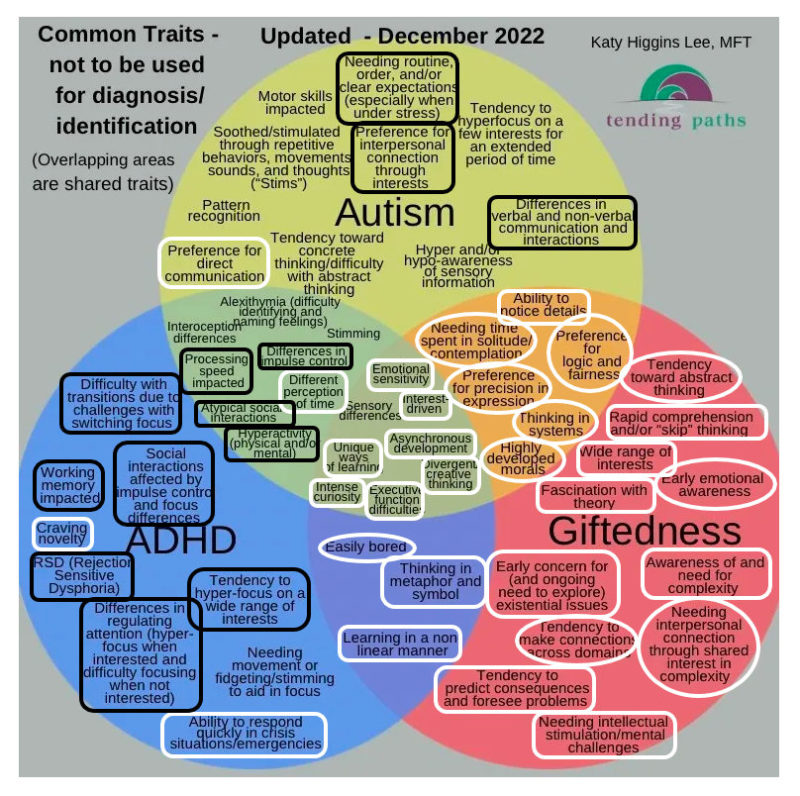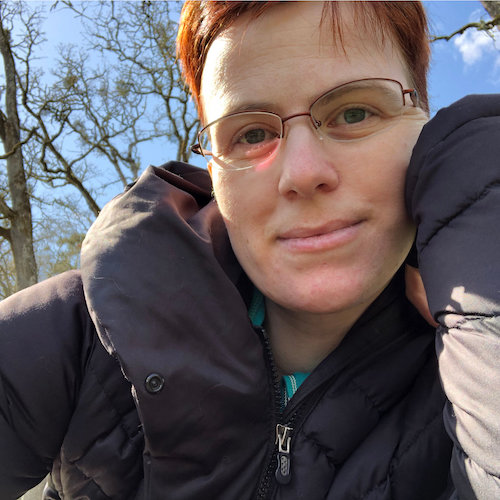I guess I have ADHD after all
TLDR: I have accommodated how my brain works and have considered this just “who I am” and found other non-pathology labels to explain myself for so long that I didn’t recognize myself in the pathologizing descriptions of ADHD that are commonly found online. I only recognized myself when I started reading people reframing ADHD as neurodivergence, and even then it took me awhile to deconstruct the pathology language surrounding it. Here are some notes from my journey, and some thoughts about seeing ADHD as a neurotype and not a disorder.
I have been having a slow-moving awakening around neurodivergence that just yesterday catalyzed into an epiphany. This post is about all the ways I have been connecting the dots.
Everything that is described in ADHD as a pathology, I have always framed to myself as just how I am, and found other, non-pathologizing labels to explain. (Plus a lot of what is truly dysfunctional about me is usually pretty easy to assign to my CPTSD or FA attachment.)
- Sure I have a ton of different interests, but that just means I’m a generalist, and a multipotentialite.
- Yes, my mind goes in a million directions at once, but that’s because I’m an ENFP, I’m gifted, I have a Rainforest Mind.
- Ok yeah, I have a different relationship with time than most people, but time is a social construct of capitalism and a disciplinary society and maybe polychronicity is more natural.
I didn’t recognize myself in descriptions of ADHD, because I accommodate myself all day as a matter of course, and I have an inner fuck-you to “normality” that I internalized from my family at a young age.
Also, I’m privileged and capitalism-capable enough to have been able to build a lifestyle around accommodating every mental whim that arises in myself (what is labeled as distractions but I just consider the thing I’m interested in right now that I didn’t happen to be interested in 5 seconds ago).
When I wake up (even if it’s too early), my mind switches on at full speed, and I can’t turn it off again. But I just shrug and get up and know I’ll catch a nap later. So I don’t struggle to stay asleep, I just nap sometimes.
I also journal constantly to keep my unprocessed thoughts from building up, which I think also helps me sleep. And I take melatonin before bed, but that’s because of a whole other thing called Delayed Sleep Phase Syndrome and…hmmm, wait….quick Google search…oh shit, I guess that’s more common with people with ADHD too!? (This is how the last week has been going for me).
Basically, I’m just neurodivergent AF.
I’ve been thinking about this Venn diagram a lot. You can find the original, non-marked-up version at Tending Paths.
- The white are things I originally circled and went, “Yup, I’m gifted, that’s all. Nothing to see here!”
- The black are things I also circled when I started imagining the non-pathologized version of those traits, or thinking about how I felt 20 years ago, before I spent two decades doing self-healing work, eliminating shame and self-blame, and using mindfulness to figure out how to be optimally myself.

Let’s talk about all the ADHD concepts I’ve Googled this week.
Hyperfocus
I didn’t understand what this was, because to me it’s just a flow state. It’s just what creative flow looks like to me. I did use to overdo it, but somewhere in my late 20s, I trained myself to stop. I called it, having boundaries with my muse. Yes, I could stay up all night working on this, but I’ll be miserable tomorrow, so I’m going to stop now. So it stopped being a problem, and just became a normal part of how I am. (This is going to be a theme).
Interest-based nervous system
This is really the phrase that stopped me in my tracks. Yeah, duh I have an interest based nervous system. What other kind of nervous system is there? Who wants to be bored? It’s become so natural to me that I didn’t think about it as a deficit or even really a difference. I’m always running into people who are forcing themselves to do things they hate, and I’m just like, but why tho?
But I’ve realized that they must not hate it as much as I hate it, or they wouldn’t be able to function. I stopped forcing myself to do things because it made me really fucking depressed. So I stopped sometime in my 20s, and trained myself to follow my intrinsic motivation only. (And, as mentioned, I’m able to be self-employed which makes it a hell of a lot easier to do that.)
Focusing on intrinsic motivation made me a lot happier, but I kinda thought, this is how we should all be living. It’s why I’m so adamant that we need UBI. Capitalism is coercive to everyone, but it’s quite a lot more coercive to people who find it debilitating to their mental health to have to force themselves to do boring shit just to eat.
So, I’ve been dancing around this difference my whole life. But I’m so averse to fitting into normality anyway, that it didn’t really occur to me that who I am and this thing people call ADHD were the same thing.
Time blindness
I have reminders for everything related to time, and I simply don’t expect myself to have an “internal clock”. I never considered calling that “time blindness” although it now seems pretty obviously the right word to describe my relationship with time: I only relate to it when I need to for some reason. Otherwise, I don’t really care what time it is.
I’m in the eternal now, and I just accept I will be periodically interrupted by my phone reminding me to do important things, like hang out with a friend, or take my melatonin, or go to bed, or take the laundry out of the dryer. I certainly never expect myself to remember those things. That’s what my phone is for.
I often don’t know what day it is, and I rely on my calendar alerts. If I make an appointment, my calendar automatically creates a reminder for 10 mins beforehand, which is the perfect amount of time for me to switch tasks without losing track of what I’m doing next. I can remember that I am about to do a thing for 10 minutes. If the alert was half an hour before, I’d get engrossed in something else and forget all about it.
Sometimes I set up multiple alerts if I need to prepare more for a thing. If I have to be somewhere else for the appointment (i.e. it’s not on Zoom), I’ll set a preceding alert that takes into account how much time it takes to get ready and drive there. If I have an appointment for the morning, I will also add a reminder for 10 hours prior to that, reminding me to not stay up late, because I won’t be able to sleep in.
I know my calendar will remind me, so I am then free to forget about time completely, which I generally do.
I barely schedule anything, because I know that being “busy” doesn’t work for me–I need nearly all of my time to be unstructured.
I also time anything where timing matters. If I am making a quesadilla, I will set a timer for 2 mins so I don’t forget about it. I have a rule: don’t start cooking something and leave the kitchen without setting a timer. Even if it’s only for 2 minutes. But really, try not to leave the area, even for 2 minutes. Wash the dishes or something. You don’t want to open the microwave tomorrow and discover something you heated up yesterday and then forgot.
And now that I write it all out, it sounds a whole lot weirder than it feels in practice. ?
Self-accommodations
The ways I deal with my time blindness are all things that people with ADHD get trained to do to help themselves; I just figured them out for myself a long time ago (although, now that I’m reading more, I’m discovering more ideas I hadn’t considered before, which is great!).
I doubt I would fit the diagnostic criteria for ADHD, because they are all based on disorder and dysfunction. I don’t have a diagnosable “problem”, because I don’t expect my brain to do things it can’t, and I reject the idea that I ought to conform to a world that isn’t build for how my mind works.
I don’t forget important things, but I also don’t expect myself to remember very much either. Is that a “working memory problem”? It’s not a problem for me, because I don’t expect myself to be different.
I don’t forget my keys because they are always in the same place. And I have trained myself to always check that I have three things when I go out: keys, wallet, phone. Keys, wallet, phone. Keys, wallet, phone. I don’t forget because I adapted to myself a long time ago.
I minimize what I have to remember, and what I “have” to do, so I don’t forget and I don’t live in a constant state of resistance. Which means I don’t appear, to myself, to have a “problem”…but what I have realized this week is just how much the way I live is in no way “typical”.
Optimal stimulation level theory & moderate brain arousal
I’ve always done this, but I didn’t realize there was a word for it until I watched this Dr. K video. I am constantly moderating how much mental stimulation is coming at me, to try to reach an optimum state. It’s why I used to watch TV while I worked, and then pause it when something too complex was happening in either my work or my show, and I could no longer focus on both at the same time. It’s why I love casual Farmville-esque games that require you to be constantly low-level aware of something other than your primary focus. I can just add it to the mix any time I feel like I need a little something something attention-wise.
I am, as I write this article, also playing a game. And thinking about the Midjourney prompt I want to use for the image. And checking FB to see if anyone responded to my post yesterday about ADHD. I will go play Beat Saber in a few minutes. And I will do this all day. I’ll get the article done eventually, but I have no idea when. Maybe in half an hour, maybe tomorrow, maybe next week. (Although I’m guessing later today, because of the energy level I have around the topic right now). And along the way, I’ll have written in many small focus-increments, interspersed with all kinds of other things, and maybe a few long focus-increments.
This is just how I live. I don’t keep track of what my attention does, I just let it do its thing.
So yes, I have massively scattered attention…but I just roll with it most of the time. I don’t fight myself, so it’s not a problem. I support myself as I need to, and I don’t have a belief that I should be different, so it never occurred to me to call that “attention deficit disorder”.
My attention is not deficient, it’s just different. I ask myself, “What was I just doing?” quite a lot. And then I either remember, and go back to it, or I don’t, and I do something else. Either way, it’s not a problem, because I decided a long time ago to stop thinking of it as a problem.
Social model of disability
This idea posits that it’s not my brain that is the problem, it’s the fact that society is not set up for my brain that can cause me problems. This is distinct from the medical model of disability.
From this article:
Where the pathology paradigm asks questions such as “what is wrong with the individual?”, the social model of disability asks questions such as “what are the barriers to accessibility and inclusion?”
The pathology paradigm places the onus on the individual to adapt to the typical majority; their differences are medicalized, and seen as problems to overcome….the individual is expected to adapt and change — sometimes suppress the very essence of who they are — in order to please the neurotypical majority.
This is GREAT, and also, this is all so new that my spellcheck doesn’t have words like neurodivergent and neurotypical and neurotype in it. I’ve got red squiggly lines all over the place here. ?
This is all great, actually
I’m actually pretty tickled because this label gives me a new set of ideas to play with, tons of new content to consume, and a whole new set of people to relate to, and/or a new dimension to relate to some of my existing people with.
But we really need to redo this whole idea of ADHD to take it out of the realm of pathology and dysfunction and deficit and disorder, and into neurodivergence and neurotype.
This page on ADHD-as-identity vs ADHD-as-disorder is going in that direction, and was a big part of this whole awakening for me.
Toward ADHD as a neurotype, not a disorder
I asked ChatGPT to tell me what a non-pathology based description of ADHD would sound like: “If you were to describe ADHD as a neurotype rather than a disorder, how would you describe it?”
- Dynamic Attention: People with this neurotype often have a non-linear and multifaceted way of thinking. They may be highly engaged and focused on activities that genuinely interest them while finding it challenging to engage with tasks that do not resonate.
- Creative and Divergent Thinking: Many individuals with ADHD demonstrate remarkable creativity and the ability to think outside the box. They often excel at connecting disparate ideas and finding unique solutions.
- Sensitivity to Stimulation: This neurotype may include a heightened sensitivity to external stimuli, leading to both a rich sensory experience and potential challenges with sensory overload.
- Desire for Novelty and Exploration: A strong inclination toward novelty and exploration can lead to a love of learning, adventure, and excitement. This quality may also contribute to restlessness or difficulty with routine tasks.
- Emotional Intensity: Emotional experiences may be particularly vivid and intense, leading to deep empathy, passion, and engagement, but also to potential challenges with emotional regulation.
- Flexible Approach to Time and Tasks: A flexible and intuitive approach to time management might resonate with this neurotype. Structured schedules may feel constraining, while a more fluid and responsive approach might be empowering.
I think this is a start, but it’s a bit too general. (If you have other resources, please share in the comments!)
I did find a better self-assessment: the Adult ADHD Self-Report Scale, but I wish it acknowledged the ways we learn to mask and develop workarounds as adults that can make ADHD hide in plain sight. For example, instead of, “How often do you find yourself talking too much when you are in social situations?”, it might say, “How often do you find yourself monitoring how much you are talking and worrying about whether you are talking too much?”. Or instead of, “How often do you have problems remembering appointments or obligations?”, it might say, “Do you have to set up multiple reminders and allow plenty of buffer time so you are not late to appointments or forget them altogether?”.
In any case, now that I see it, I can’t unsee it, and it has started a process of re-evaluation and reconfiguring as I incorporate this new information into my understanding of myself. I’m sure I’ll write more about it in the future, but that’s it for now! ?

If my writing has helped you, you can leave a tip at buymeacoffee.com, leave a comment below, learn more about me, or follow me on Instagram.
Thanks so much for reading! ~Emma

